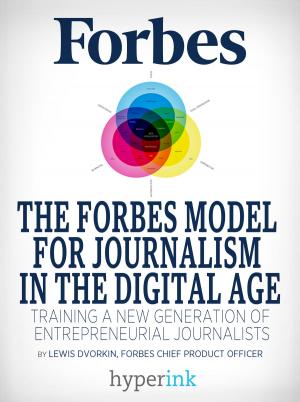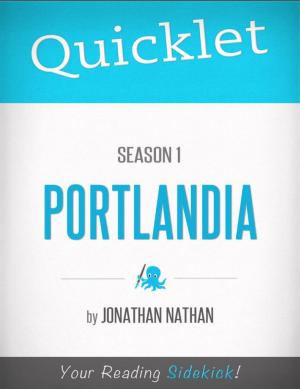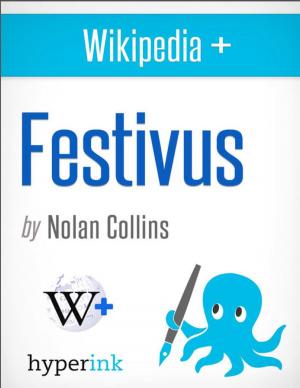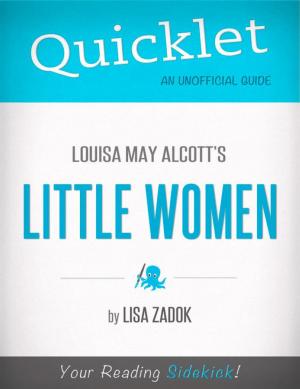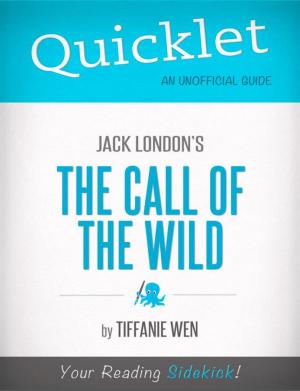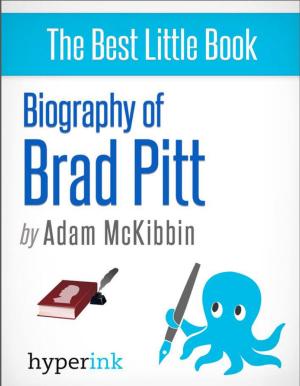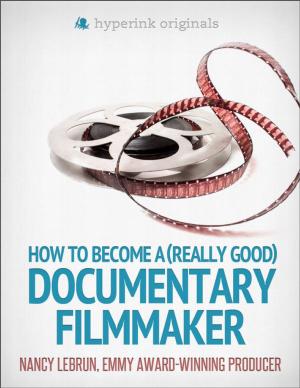Quicklet on H.G. Wells' The Island of Dr. Moreau (CliffNotes-like Book Summary)
Nonfiction, Reference & Language, Study Aids, Book Notes, Fiction & Literature, Literary Theory & Criticism| Author: | Mandy Howard | ISBN: | 9781614649830 |
| Publisher: | Hyperink | Publication: | February 24, 2012 |
| Imprint: | Hyperink | Language: | English |
| Author: | Mandy Howard |
| ISBN: | 9781614649830 |
| Publisher: | Hyperink |
| Publication: | February 24, 2012 |
| Imprint: | Hyperink |
| Language: | English |
ABOUT THE BOOK
If you’ve ever had moral qualms with grisly medical experiments,
secretly wondered what a cross between a man and a hog would look like, or even taken issue with the testing of cosmetics on animals, the book The Island of Dr. Moreau by H.G. Wells will address your sticky ethical questions and give you ideas you can really sink your teeth into.
The philosophical themes addressed in this novel, such as the human drive to scientifically meddle with nature, unearth the origin of identity, and determine whether evil can be considered innate, will spark the contemporary interest, even though H.G. Wells wrote his book in 1896. The dark plot-twists and gruesome details make this classic a page-turner.
The book is often introduced as a middle or high school text, because the language is so simple, the imagery so visceral, and the plot turns riveting. The Island of Dr. Moreau satisfies both the reader that is looking to be entertained, and the reader who enjoys being challenged by controversial ideas with real-world implications.
Although categorized as science fiction, this book doesn’t dramatically push the boundaries of what was conceivably possible in 1896, let alone today. There are no space monsters, no underground populations of elves, and no time-sucking wormholes. What makes The Island of Dr. Moreau a good read is that there are disturbed characters possessing some very disturbing science.
The parallels between Wells’ concerns are surprisingly similar to our ethical questions about scientific testing today, and shed light on universal concerns of humanism and the implications of scientific thinking.
MEET THE AUTHOR
Sara Sisun is a writer and painter born in Denver, Colorado. She received a BA in Art and Writing at Stanford University in 2009 and an MFA at the San Francisco Art Institute in 2011. She has studied at the Art Students League of Denver, the Slade School of Art, and Oxford University. She is the recipient of the Allied Arts Award, the New York Art Exchange Scholarship, and the Elizabeth Greenshields Fellowship. Sara currently teaches, writes, and paints in San Francisco, California.
EXCERPT FROM THE BOOK
The Industrial Revolution between the 1790s and the 1860s had massive implications for culture and industry that impacted everyone living at the time. The transition from an agriculturally based economy to one dependent on manufacturing had implications on the daily lives of people from all classes. The invention of steam power lead to the introduction of the internal combustion engine and electrical power.
Emerging from the steamy glow of manufacturing and electricity were new intellectual ideas. Adam Smith introduced The Wealth of Nations arguing that a capitalist system would increase wealth and prosperity for all. Karl Marx saw capitalism as separating society into the wealthy class of bourgeoisie and the working class, he predicted that these would inevitably lead to socialism and the communist ideal.
Wells was among many authors of the time who questioned the implications of the science of the Enlightenment. The stories seek to question the limits of what can be done and what should be done with the new capabilities of science.
Buy a copy to keep reading!
ABOUT THE BOOK
If you’ve ever had moral qualms with grisly medical experiments,
secretly wondered what a cross between a man and a hog would look like, or even taken issue with the testing of cosmetics on animals, the book The Island of Dr. Moreau by H.G. Wells will address your sticky ethical questions and give you ideas you can really sink your teeth into.
The philosophical themes addressed in this novel, such as the human drive to scientifically meddle with nature, unearth the origin of identity, and determine whether evil can be considered innate, will spark the contemporary interest, even though H.G. Wells wrote his book in 1896. The dark plot-twists and gruesome details make this classic a page-turner.
The book is often introduced as a middle or high school text, because the language is so simple, the imagery so visceral, and the plot turns riveting. The Island of Dr. Moreau satisfies both the reader that is looking to be entertained, and the reader who enjoys being challenged by controversial ideas with real-world implications.
Although categorized as science fiction, this book doesn’t dramatically push the boundaries of what was conceivably possible in 1896, let alone today. There are no space monsters, no underground populations of elves, and no time-sucking wormholes. What makes The Island of Dr. Moreau a good read is that there are disturbed characters possessing some very disturbing science.
The parallels between Wells’ concerns are surprisingly similar to our ethical questions about scientific testing today, and shed light on universal concerns of humanism and the implications of scientific thinking.
MEET THE AUTHOR
Sara Sisun is a writer and painter born in Denver, Colorado. She received a BA in Art and Writing at Stanford University in 2009 and an MFA at the San Francisco Art Institute in 2011. She has studied at the Art Students League of Denver, the Slade School of Art, and Oxford University. She is the recipient of the Allied Arts Award, the New York Art Exchange Scholarship, and the Elizabeth Greenshields Fellowship. Sara currently teaches, writes, and paints in San Francisco, California.
EXCERPT FROM THE BOOK
The Industrial Revolution between the 1790s and the 1860s had massive implications for culture and industry that impacted everyone living at the time. The transition from an agriculturally based economy to one dependent on manufacturing had implications on the daily lives of people from all classes. The invention of steam power lead to the introduction of the internal combustion engine and electrical power.
Emerging from the steamy glow of manufacturing and electricity were new intellectual ideas. Adam Smith introduced The Wealth of Nations arguing that a capitalist system would increase wealth and prosperity for all. Karl Marx saw capitalism as separating society into the wealthy class of bourgeoisie and the working class, he predicted that these would inevitably lead to socialism and the communist ideal.
Wells was among many authors of the time who questioned the implications of the science of the Enlightenment. The stories seek to question the limits of what can be done and what should be done with the new capabilities of science.
Buy a copy to keep reading!

